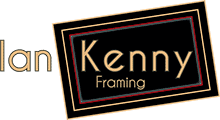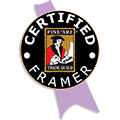Picture framing glass & glazing : options
Super Clear UV+ glass
Reflection control, water white, clear coated glass will reduce reflection at 90 degrees to less than 1%, and will provide ultra violet light filtering to 97+% (standard glass is around 45%). A coating of oxides deposited onto the glass works to reduce reflection by counteracting and thereby ‘flattening’ the light rays as they bounce back off the surface.
It also boasts true colour transmission, and gives a stunning effect of clarity. This type of glass is superb for mixed media works with texture, unvarnished oils, charcoals, fabrics etc as the quality of the surface remains vibrant and clear.
Super Clear UV glass
This reflection control, water white, clear coated glass will also reduce reflection at 90 degrees to less than 1%. It costs less than the Super Clear UV+ glass simply because the uv protection factor is around 70%. Because it is water white, it also gives the stunning effect of clarity as its more expensive cousin. It’s simply superb for mixed media works with texture, unvarnished oils, charcoals and fabrics, as the quality of the surface remains vibrant and clear.
Standard glass
Used for generations, standard glass offers basic protection for relatively low cost. It is reflective, particularly against dark backgrounds. Over lighter surfaces, it can show a slight colour cast. Its natural uv filter properties are minimal at around 45%, but despite this it remains a firm favourite, and is perfectly fine for items which hold no real commercial or sentimental value.
Diffused glass
Recognisable by its etched surface, diffused glass remains an option. Many people are still under the impression that it will stop artwork fading. This isn’t the case – it provides no more protection from uv light than normal reflective picture glass. It’s commonly called non-reflecting glass, which is not quite right either. The reflection is diffused, and creates the effect of a white sheen across the surface, so it should properly be called diffused reflection glass.
It’s not recommended in any framing combination which requires the glass to be raised away from the surface of the work. The etched surface makes the artwork appear more out of focus the further away it gets.
Artshield acrylic
Artshield acrylic is a high quality clear material developed specifically for fine art applications. It is extremely resistant to surface damage, and has a good uv filter. The other advantage of using acrylic is its lightness, especially significant for larger frames. Because it’s so specialist, it’s surprisingly expensive.
Laminated glass
Laminated glass is available for extremely valuable artwork. It can come with an anti-reflective uv coating, but is generally much thicker than standard glass and therefore much heavier. It’s also much, much more expensive!
We’re happy to give you informed professional advice as to which type of glazing to use. The final decision is always yours.



